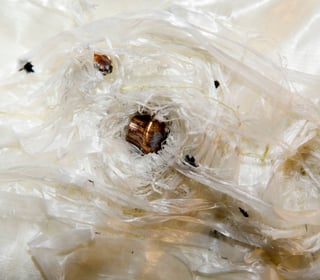Sure -- if their biology allows them to generate long chains of polymers.
Modern "bulletproof" vests (without additional hard ceramic plates) are made of multiple layers of tightly woven synthetic fibers called aramids -- aromatic polyamides. They derive their strength from having multiple chemical bonds along the polymer chain, which are oriented along the axis of the fiber when it is drawn out. Some vests have their layers of fabric additionally coated in a resin. It should be noted that while such materials will stop bullets from penetrating, the impact will often leave a "dent" below them (they're tested on clay dummies) -- this can often result in internal injuries like a broken rib or heavy bruising.
Silk is a well-known example of a naturally occurring polyamide, renowned for its tensile strength. Experiments with multiple layers of silk serving as bullet-resistant garments were done in the late 19th century, and they had some success in stopping low-velocity rounds. The most plausible construction I can think of would be for your creature to use spinnerets to encase themselves repeatedly in a cocoon, precisely woven in a geometric pattern found in nature, and finally setting the layers together with an exuded resin (possibly spread manually over & into the layers). The damage done to this material is not "spot"-repairable -- the integrity of the fibers and the weave are compromised -- so your creature would have to discard the entirety of each damaged layer via shedding, and rebuild fresh ones.
All of these characteristics point to some sort of insect biology -- convenient, as it's estimated they're 80% of the world's species (900,000+ different kinds) so there's plenty of room for such unusual evolutionary exploration while maintaining a reasonable suspension of disbelief.

